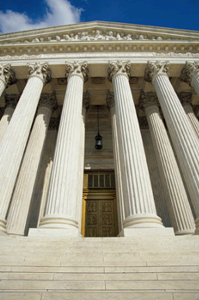
 In a 7-2 decision authored by Justice Breyer, the Supreme Court held yesterday that an "appellate court must apply a 'clear error,' not de novo, standard of review" to the evidentiary underpinnings of a district court's claim construction determination. Teva Pharmaceuticals USA, Inc. v. Sandoz Inc., No. 13-854, slip op. at 1-2 (U.S. Jan. 20, 2015). But what are those evidentiary underpinnings? Apparently everyone was in agreement that "when the district court reviews only evidence intrinsic to the patent (the patent claims and specification, along with the patent's prosecution history), the judge's determination will amount solely to a determination of law, and the Court of Appeals will review that construction de novo." Id. at 11-12. In contrast, when a district court consults extrinsic evidence, it "will need to make subsidiary factual findings about that extrinsic evidence." Id. at 12. It is this fact finding that is entitled to deference under Federal Rule of Civil Procedure 52(a)(6). Nevertheless, the Court was clear that "the ultimate question of construction will remain a legal question." Id. at 13. Therefore, "[f]or example, if a district court resolves a dispute between experts and makes a factual finding that, in general, a certain term of art had a particular meaning to a person of ordinary skill in the art at the time of the invention, the district court must then conduct a legal analysis: whether a skilled artisan would ascribe that same meaning to that term in the context of the specific patent claim under review." Id. at 12. Using the present case as illustrative, when the District Court credited the explanation of Teva's expert regarding how a skilled artisan would use a patent figure to determine what a potentially ambiguous claim term meant ("molecular weight"), it resolved a subsidiary factual issue. And because the Federal Circuit did not afford any deference to this finding on review, the appellate court's judgment was vacated, and the case was remanded for further processing consistent with the Supreme Court's opinion.
In a 7-2 decision authored by Justice Breyer, the Supreme Court held yesterday that an "appellate court must apply a 'clear error,' not de novo, standard of review" to the evidentiary underpinnings of a district court's claim construction determination. Teva Pharmaceuticals USA, Inc. v. Sandoz Inc., No. 13-854, slip op. at 1-2 (U.S. Jan. 20, 2015). But what are those evidentiary underpinnings? Apparently everyone was in agreement that "when the district court reviews only evidence intrinsic to the patent (the patent claims and specification, along with the patent's prosecution history), the judge's determination will amount solely to a determination of law, and the Court of Appeals will review that construction de novo." Id. at 11-12. In contrast, when a district court consults extrinsic evidence, it "will need to make subsidiary factual findings about that extrinsic evidence." Id. at 12. It is this fact finding that is entitled to deference under Federal Rule of Civil Procedure 52(a)(6). Nevertheless, the Court was clear that "the ultimate question of construction will remain a legal question." Id. at 13. Therefore, "[f]or example, if a district court resolves a dispute between experts and makes a factual finding that, in general, a certain term of art had a particular meaning to a person of ordinary skill in the art at the time of the invention, the district court must then conduct a legal analysis: whether a skilled artisan would ascribe that same meaning to that term in the context of the specific patent claim under review." Id. at 12. Using the present case as illustrative, when the District Court credited the explanation of Teva's expert regarding how a skilled artisan would use a patent figure to determine what a potentially ambiguous claim term meant ("molecular weight"), it resolved a subsidiary factual issue. And because the Federal Circuit did not afford any deference to this finding on review, the appellate court's judgment was vacated, and the case was remanded for further processing consistent with the Supreme Court's opinion.
Justice Thomas, joined by Justice Alito, dissented. He framed the question as "whether claim construction involves findings of fact," and would have held that it does not. Teva Pharm., No. 13-854, slip op. at 1 (U.S. Jan. 20, 2015) (Thomas, J., dissenting). Patent claim construction is most closely analogized to statutory interpretation, according to the dissent, "[b]ecause they are governmental dispositions and provide rules that bind the public at large . . . ." Id. at 7. The dissent warned that "today's decision will result in fewer claim construction decisions receiving precedential effect, thereby injecting uncertainty into the world of invention and innovation." Id. at 15. Interestingly, this was a concern expressed by several companies that will be directly impacted by this decision. Only three amicus briefs were submitted by operating companies (representing 20 companies in total), but each of these urged maintaining the de novo standard of review because of the impact any change will have on their respective businesses. See "Teva v. Sandoz -- Is Deferential Review a Boon for Patent Trolls?"
Patent Docs will provide additional analysis of these opinions in subsequent posts.